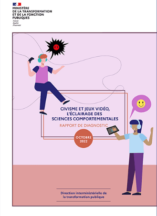According to a 2019 US study, 74% of adults who play online multiplayer games in the US have experienced some form of harassment, ranging from insults based on their identity, ethnicity, gender and sexual orientation, to stalking, sexual harassment and physical threats.
In a study commissioned by the DILCRAH (Délégation Interministérielle à la Lutte Contre le Racisme, l’Antisémitisme et la Haine anti-LGBT), the BIT and the DITP (Direction Interministérielle de la Transformation Publique) identified the determinants of toxic behaviour in video games; recommended behavioural science levers to prevent these toxic behaviours, and established guidelines for the development of a common code of conduct to be disseminated by key players in the video game industry.
Are you interested in the identification, prevention, detection and management of toxic behaviour online? We’d love to talk to you!
Contact the team in charge of this project below.






